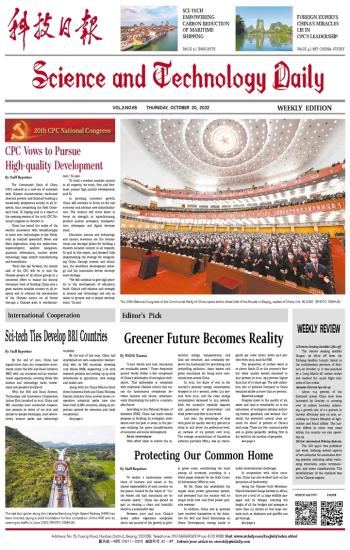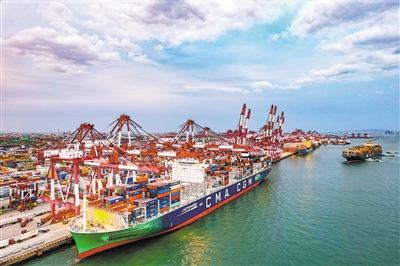
 |
| Freighters are busy loading and unloading containers at various berths, Qingdao Port in Shandong province. (PHOTO: VCG) |
As the ocean covers 75 percent of the earth's surface, reducing carbon emissions in ocean development is becoming more and more important to protect the earth. This is evident by the ascendancy of China in the maritime space over the past decade, while the country's efforts and resolution to reduce carbon emissions cannot be overlooked.
The world's first hydrogen-powered and 5G intelligent port
As the traffic volume continues to increase, the port's carrying capacity limitations has become a bottleneck that limits further development.
It quickly became evident that deploying a 3D intelligent, green and low-carbon transportation system is the way of the future. Qingdao Port is now one of the world's leading automated container terminals equipped with state-of-the-art technologies. It is also the first fully automated container terminal in Asia.
The port has achieved productivity of 36.2 containers per ship per hour on average, peaking at 52.76 containers per hour, a production efficiency that is 50 percent higher than other ports with similar automated terminals.
Meanwhile, Qingdao Port is the world's first "hydrogen + 5G" smart ecological terminal, pioneering hydrogen-powered crane technology and systems by developing a hydrogen energy-driven solution for the fueling of equipment needed for the operation of a large port.
According to Port Technology, the system reduces carbon emissions by some 3.5 kilograms and sulfur dioxide emissions by 0.11 kilograms per twenty-foot equivalent unit (TEU). Calculated on the basis of an annual capacity of three million TEU, 21,000 tons of carbon dioxide and 640 tons of sulfur dioxide emissions are estimated to be cut annually.
Net-zero ambitions for shipping
Given that 90 percent of the world's goods travel across the ocean to reach their destination, maritime shipping also plays pivotal role in tackling climate change, especially cutting carbon emissions.
At last year's COP26 climate summit in Glasgow, 22 countries signed up to the Clydebank Declaration, announcing their intention to establish various zero-emissions shipping routes known as "green corridors".
As the world's largest shipbuilder, China plans to reduce maritime emissions under the International Maritime Organization (IMO) and it is participating in the first green corridor.
Isabelle Gerretsen, a freelance journalist covering climate and environmental issues, reported that the ports of Los Angeles and Shanghai agreed in January to work on developing a plan for a zero-emission routes by the end of 2022. The Trans-Pacific corridor, as it is known, is the world's busiest cargo route.
Shipping companies are increasingly adopting new technologies that reduce the carbon footprint of their fleets, in response to concerns about climate change, said Hing Chao, chairman of Hong Kong-based Wah Kwong Shipping Agency Co. Ltd.
"I'd say the default position [of industry players] is compliance which, if we take into account the emission reduction targets set by [IMO] and other international regulatory bodies, requires everyone in the industry to take proactive steps towards improving energy efficiency," said Chao.
Adding shipping to emissions reduction scheme
According to Splash 247, Singapore's exclusive maritime news platform, the world's largest emissions trading scheme (ETS) kicked off in 2021, and shipping has been warned that it could be included in future.
While the European Union bid to include shipping in its emissions trading scheme, further east, China has had its own scheme underway as early as in February 2021, and has outlined criteria for other industries to be included.
Tim Huxley, chairman of Hong Kong-based Mandarin Shipping, said that the new scheme impacting shipping is viewed as "inevitable".
In view of this, a new market-based measure to cut shipping emissions has been put forward to the IMO by a powerful grouping led by China and supported by Argentina, Brazil, South Africa and the United Arab Emirates in early 2022. The proposal is both a predictable pathway for international shipping towards decarbonization, and ensuring sufficient transport supply for international trade.

 Next
Next




